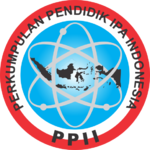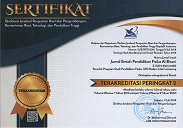Estimating Bedrock Depth Based on Total Magnetic Field Anomaly Data in Medan City Area in the Northern Sumatra Basin Using the Peter Half Slope Method
Abstract
Keywords
Full Text:
PDFReferences
Adegoke, J. A., & Layade, G. O. (2019). Comparative depth estimation of iron-ore deposit using the Data-Coordinate Interpolation Technique for airborne and ground magnetic survey variation. African Journal of Science, Technology, Innovation and Development, 11(5), 663–669. https://doi.org/10.1080/20421338.2019.1572702
Taloor , A.K., Kothyari, G.C., Dumka, R.K., Alam, A., & Malik, K. (2023). Crustal deformation study of Kashmir basin: Insights from PSInSAR based time series analysis. Journal of Applied Geophysics, 221(104979,), 23–44. https://doi.org/https://doi.org/10.1016/j.jappgeo.2023.104979.
Akpa, C. , N. Nnabo, P., Arisi Obasi, C. C. A. I., Obasi, P. N., & Nworie, D. C. (2023). Application of ground magnetic method for delineation subsurface structural control on sulphide ore deposit in benue trough; A case study of Ikenyi Izzi. Earth Science Malaysia, 7(1), 07–19. https://doi.org/10.26480/esmy.01.2023.07.19
Alimuddin, M., & Rustadi, R. (2022). (2022). Identification of Geothermal Reservoir Zone at Mount Ijen East Java Based on 2 Dimensional Modeling of Geomagnetic Anomalies. Positron,. Positron, 12(1), 1–17.
Alisna, S., & Sinuraya, S. (2021). Pemetaan suseptibilitas magnetik dan penentuan kandungan logam pada air gambut di Kelurahan Tuah Madani Kecamatan Tampan Pekanbaru. Komunikasi Fisika Indonesia, 18(1), 12. https://doi.org/10.31258/jkfi.18.1.12-17
Alrahmadana, A. R. R., Rifai, H., Syafriani, S., Mufit, F., & Sudiar, N. Y. (2022). Magnetic susceptibility of volcanic soil on the surface of Mount Singgalang, Sumatra Barat. Jurnal Fisika Dan Aplikasinya, 18(2), 31. https://doi.org/10.12962/j24604682.v18i2.12361
Arafat, Y., Daud, Y., Kumara, D. A., Fortuna, D. A., Yunus, F. M., Avicienna, H. F., & Farhan. (2020). Combination study of magnetic method and 3-D inversion of gravity data to determine the Blawan-Ijen geothermal prospect zone. IOP Conference Series: Earth and Environmental Science, 538(1). https://doi.org/10.1088/1755-1315/538/1/012036
Astawa, N., Silalahi, I. R., & Rahardiawan, R. (2016). Geologi bawah permukaan dasar lautperairan lembar peta 0421, Daerah Istimewa Aceh. Jurnal Geologi Kelautan, 10(2), 101. https://doi.org/10.32693/jgk.10.2.2012.220
Asyqari, A., Sugiyanto, D., Yanis, M., Abdullah, F., & Ismail, N. (2019). Mapping of archaeological structure along east-coast of Aceh Besar District, Indonesia based on total magnetic field anomalies. IOP Conference Series: Earth and Environmental Science, 348(1). https://doi.org/10.1088/1755-1315/348/1/012041
Bohal, Y. M., Fermantono, I., & Mariyanto, M. (2023). Geomagnetic data analysis to identify subsurface condition of Gondang Area, Bojonegoro. IOP Conference Series: Earth and Environmental Science, 1227(1). https://doi.org/10.1088/1755-1315/1227/1/012041
Farazi, A. H., Hossain, M. S., Ito, Y., Piña-Flores, J., Kamal, A. S. M. M., & Rahman, M. Z. (2023). Shear wave velocity estimation in the Bengal Basin, Bangladesh by HVSR analysis: implications for engineering bedrock depth. Journal of Applied Geophysics, 211(February). https://doi.org/10.1016/j.jappgeo.2023.104967
Heningtyas, H., Wibowo, N. B., & Darmawan, D. (2020). Pemodelan 2D dan 3D metode geomagnet untuk interpretasi litologi dan analisis patahan di jalur Sesar Oyo. Jurnal Lingkungan dan Bencana Geologi, 10(3), 115. https://doi.org/10.34126/jlbg.v10i3.157
Innocent, A. J., Chidubem, E. O., & Chibuzor, N. A. (2019). Analysis of aeromagnetic anomalies and structural lineaments for mineral and hydrocarbon exploration in Ikom and its environs southeastern Nigeria. Journal of African Earth Sciences, 151, 274–285. https://doi.org/10.1016/j.jafrearsci.2018.12.011
Jayanti, Y. D., Arman, Y., & Zulfian, Z. (2023). Pendugaan jenis batuan bawah permukaan lembar Banjarmasin kalimantan selatan berdasarkan anomali magnetik. Prisma Fisika, 10(3), 234. https://doi.org/10.26418/pf.v10i3.57850
Kette, O., Sutaji, H. I., & Bernandus, B. (2020). Interpretasi pola penyebaran batuan dan daerah terakumulasi air tanah menggunakan metode magnetik Desa Oematnunu Kabupaten Kupang. Jurnal Fisika : Fisika Sains Dan Aplikasinya, 5(2), 133–138. https://doi.org/10.35508/fisa.v5i2.2284
Kurniawan, M., Sismanto, & Rugayya, S. (2020). Identification of igneous rock distribution in Kalisonggo area using geomagnetic method. Journal of Physics: Conference Series, 1434(1). https://doi.org/10.1088/1742-6596/1434/1/012010
Layade, G. O. (2023). Investigation Of Mineral Deposition In Ijeda, Osun State Southwestern Nigeria Using Ground Magnetic Data. 7(4), 1–14. https://www.ncbi.nlm.nih.gov/books/NBK558907/
Mallick, J., Khan, R. A., Ahmed, M., Alqadhi, S. D., Alsubih, M., Falqi, I., & Hasan, M. A. (2019). Modeling groundwater potential zone in a semi-arid region of aseer using fuzzy-ahp and geoinformation techniques. Water (Switzerland), 11(12). https://doi.org/10.3390/w11122656
Manea, E. F., Cioflan, C. O., Coman, A., Michel, C., Poggi, V., & Fäh, D. (2020). Estimating geophysical bedrock depth using single station analysis and geophysical data in the extra-carpathian area of Romania. Pure and Applied Geophysics, 177(10), 4829–4844. https://doi.org/10.1007/s00024-020-02548-3
Muchlis, & Elders, C. (2020). Structural style of the North Sumatra basin, offshore Aceh. IOP Conference Series: Materials Science and Engineering, 796(1). https://doi.org/10.1088/1757-899X/796/1/012038
Muchtar, A., Manurung, Z. K. M., Rustadi, R., Suparman, Y., & Jumarang, M. I. (2022). Identifikasi Zona reservoir panas bumi Gunung Ijen Jawa Timur berdasarkan pemodelan 2 dimensi anomali geomagnetik. Positron, 12(1), 92. https://doi.org/10.26418/positron.v12i1.49130
Nagarajan, N. (2020). Earth’s Magnetic Field and its Wandering Magnetic Poles. Resonance, 25(3), 363–379. https://doi.org/10.1007/s12045-020-0951-9
Novianto, A., Sutanto, Suharsono, Prasetyadi, C., & Hidayat, W. (2020). Configuration of Kendeng Basin (geomagnetic methods analysis). AIP Conference Proceedings, 2251(August). https://doi.org/10.1063/5.0015974
Olufemi, O. A., Yinka, A. M., Alao, E. I., & Alexander, A. F. (2020). Magnetic rocks distribution and depth to basement analysis on an old quarry site, Abeokuta, SW Nigeria. Iranian Journal of Earth Sciences, 12(3), 176–183.
Padmawidjaja, T. (2019). Konfigurasi cekungan tomori berdasarkan data gayaberat tomori basin configuration based on gravity data. Jurnal Geologi Dan Sumberdaya Mineral, 20(1), 27–36. https://doi.org/10.33332/jgsm.2019.v.20.1.27-36
Parigi, G., Ravera, E., & Luchinat, C. (2019). Magnetic susceptibility and paramagnetism-based NMR. Progress in Nuclear Magnetic Resonance Spectroscopy, 114–115(June), 211–236. https://doi.org/10.1016/j.pnmrs.2019.06.003
Patro, P. K., Kumar, P. V., Abhirami, S. G., Kumar, D., Satyanarayanan, M., Srinivas, K. N. S. S. S., ... & Reddy, K. C. (2023). (2023). Integrated subsurface investigation for magmatic sulfide mineralization in Betul Fold Belt, central India. Journal of Applied Geophysics, 211, 104974.
Popoola, O. I., Adenuga, O. A., & Joshua, E. O. (2021). Ground magnetic survey to investigate magnetic minerals at Iboro Village, Abeokuta, south-western Nigeria. Scientia Africana, 20(2), 99–106. https://doi.org/10.4314/sa.v20i2.9
Putra, P. R., & Raguwanti, R. (2021). Hydrocarbon prospectivity and petroleum system in West Sumatra Forearc Basin. Berita Sedimentologi, 46(1), 44–50. https://doi.org/10.51835/bsed.2020.46.1.59
Putri, A. A., & Adhi, M. A. (n.d.). Penentuan struktur regional cekungan Sumatera Utara area prospek Langsa. UPEJ Unnes Physics Education Journal, 11((3)), 41-48.
Rahman, M. Z., Siddiqua, S., & Kamal, A. S. M. M. (2021). Site response analysis for deep and soft sedimentary deposits of Dhaka City, Bangladesh. Natural Hazards, 106(3), 2279–2305. https://doi.org/10.1007/s11069-021-04543-w
Ramdani, R., Refrizon, R., Yuliza, E., Fadli, D. I., & Hasan, M. (2023). 2D surface structure modeling in Bengkulu City using Geomagnet Method. Jurnal Penelitian Pendidikan IPA, 9(2), 803–809. https://doi.org/10.29303/jppipa.v9i2.2914
Rizal, M., Ismail, N., Yanis, M., Muzakir, & Surbakti, M. S. (2019). The 2D resistivity modelling on North Sumatran fault structure by using magnetotelluric data. IOP Conference Series: Earth and Environmental Science, 364(1). https://doi.org/10.1088/1755-1315/364/1/012036
Rosado-Fuentes, A., Arciniega-Ceballos, A., Hernández-Quintero, E., Arango-Galván, C., Salas-Corrales, J. L., & Mendo-Pérez, G. (2021). Geophysical characterization, design and construction of the Teoloyucan Geophysical Test Site for archaeological and engineering applications, Central Mexico. Journal of Applied Geophysics, 194(February). https://doi.org/10.1016/j.jappgeo.2021.104459
Sehah, Raharjo, S. A., Prabowo, U. N., & Sutanto, D. S. (2021). Interpretation of magnetic anomaly data in the andesitic rock prospect area of Kutasari Subregency, Purbalingga Regency, Central Java, Indonesia. Indonesian Journal on Geoscience, 8(3), 345–357. https://doi.org/10.17014/ijog.8.3.345-357
Simbolon, P., Refrizon, R., & Sugianto, N. (2020). Peta sebaran intensitas anomali magnetik di daerah prospek geothermal kepahiang berdasarkan survei metode geomagnet. Newton-Maxwell Journal of Physics, 1(1), 7–12. https://doi.org/10.33369/nmj.v1i1.14290
Sirait, R. (2021). Analisis anomali magnetik dalam penentuan struktur geologi dan litologi bawah permukaan sebagai manifestasi panas bumi di Panyabungan Selatan Sumatera Utara. Jurnal Fisika Flux: Jurnal Ilmiah Fisika FMIPA Universitas Lambung Mangkurat, 18(2), 83. https://doi.org/10.20527/flux.v18i2.7402
Spencer, B. F., Hoskere, V., & Narazaki, Y. (2019). Advances in computer vision-based civil infrastructure inspection and monitoring. Engineering, 5(2), 199–222. https://doi.org/10.1016/j.eng.2018.11.030
Sulandari, B., Suteja, A., Hadibroto, H., Nurmaliah, Setyanta, B., & Garniwa, A. (2023). Deliniasi struktur sesar lampung-panjang dan identifikasi potensi sumberdaya alam berdasarkan anomali magnet daerah Bandar Lampung. Jurnal Geologi Dan Sumberdaya Mineral, 24(4), 195–203. https://doi.org/10.33332/jgsm.geologi.v24i4.721
Syafitri, N., Yolanda, A., Rasidi, H., Purnama, S. A., Ode, L., Musafar, M., & Wisnu, K. (2021). Analysis of H - Component of Geomagnetic Variation in Indonesian Region. 1–4.
Wahyudi, E. J. (2023). Inverse modeling using geomagnetic data of field camp geophysics in Karangsambung (2005-2019). IOP Conference Series: Earth and Environmental Science, 1227(1). https://doi.org/10.1088/1755-1315/1227/1/012040
Wahyuni. (2015). Developing science learning instruments based on local wisdom to improve student’s critical thinking skills. Jurnal Pendidikan Fisika Indonesia 1, 12(1), 65–76. https://doi.org/10.15294/jpfi .v11i2.4228
Widhiyatmoko, M., Putri, N.I, Zajuli, M.H.H., Iskandar, Y., Siallagan, R., Gumilar, I.S, & Nurdiana, I. (2022). Petrofisika dan pemodelan untuk evaluasi potensi hidrokarbon serpih formasi kelesa, cekungan sumatra tengah petrophysics and modeling for shale hydrocarbon potential evaluation of kelesa formation, central sumatra basin geo-resource. Jurnal Geologi Dan Sumberdaya Mineral, 21(4), 205–215.
Yuni, Y., & Fisa, L. (2020). Pembelajaran penemuan terbimbing terhadap kemampuan generalisasi matematis siswa sekolah menengah pertama. Journal of Instructional Mathematics, 1(1), 20–30. https://doi.org/10.37640/jim.v1i1.267
DOI: http://dx.doi.org/10.24042/jipfalbiruni.v13i1.18555
Refbacks
- There are currently no refbacks.

Jurnal ilmiah pendidikan fisika Al-Biruni is licensed under a Creative Commons Attribution-ShareAlike 4.0 International License.
![]()








